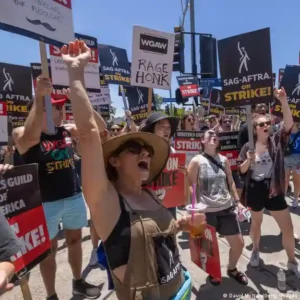 After nearly five months of picketing, protesting and negotiating, Hollywood writers have finally reached a tentative agreement with the major studios and streaming services to end their longest strike in decades.
After nearly five months of picketing, protesting and negotiating, Hollywood writers have finally reached a tentative agreement with the major studios and streaming services to end their longest strike in decades.
The Writers Guild of America (WGA), which represents about 11,500 screenwriters, announced on Sunday night that it had reached a “tentative” deal with the Alliance of Motion Picture and Television Producers (AMPTP), the trade association that represents the interests of the studios and streamers.
The deal, which still needs to be approved by the WGA’s board and members, is said to be “exceptional” and include “meaningful gains and protections for writers in every sector of the membership”, according to an email sent by the union to its members.
The full details of the agreement have not been disclosed yet, but some of the key issues that led to the strike were the residuals from streaming media, the use of artificial intelligence in the writing process, and the job security and funding for writers.
The WGA claimed that the AMPTP’s share of the streaming residuals had cut much of the writers’ average incomes compared to a decade ago, and that the use of artificial intelligence, such as ChatGPT, was threatening to replace them. The writers also wanted to increase the size of writers’ rooms, limit the length of contracts, and improve health and pension benefits.
The strike, which began on May 2, 2023, at 12:01 a.m. PDT, was the longest interruption to American film and television production since the COVID-19 pandemic in 2020, as well as the longest labor stoppage that the WGA had performed since the strike of 1988, which lasted for 153 days.
The strike had a significant impact on the entertainment industry, as many shows and movies were delayed, cancelled or moved to other platforms. Some studios had to close doors or reduce staff due to the lack of ongoing productions. It also jeopardized long-term contracts created during the media streaming boom when producers were shelling out large sums to creative talent . In addition, numerous other areas within the global entertainment ecosystem were affected by the strike action, such as the VFX industry and prop making studios.
The strike also coincided with a SAG-AFTRA strike since July 14, 2023, marking the first time in over 60 years both unions have been on strike at the same time . The actors’ union is still in negotiations with the AMPTP over issues such as residuals, diversity and inclusion, and safety protocols.
The deal between the WGA and the AMPTP came after five marathon days of renewed talks by negotiators for both sides, which were joined by four top industry executives – Iger, Warner Bros Discovery CEO David Zaslav, Netflix co-CEO Ted Sarandos and NBCUniversal Studio Group Chair Donna Langley – who helped to break the months-long impasse.
California Gov. Gavin Newsom and Los Angeles Mayor Karen Bass also offered to help mediate an end to the strikes, expressing their support for the striking workers and their concerns over the stress and anxiety they were feeling .
The agreement is expected to be voted on by the WGA’s board on Tuesday, and then by its members before the strike officially ends. If approved, it would mark a historic victory for Hollywood writers and a relief for millions of fans who have been waiting for their favorite shows and movies to resume production


